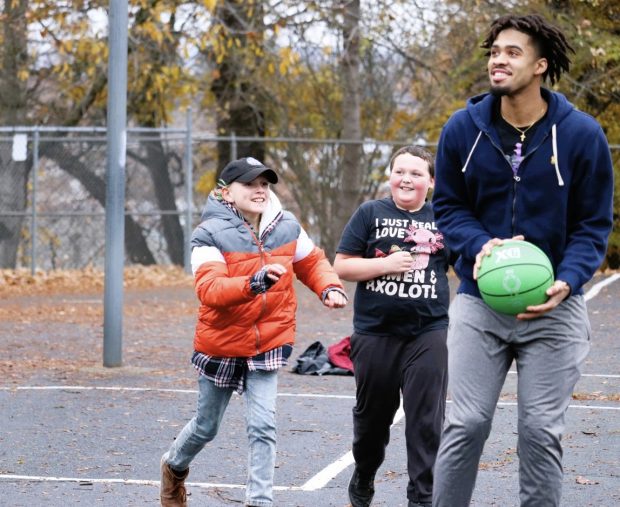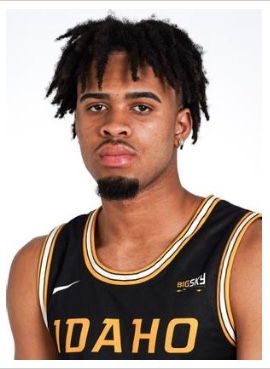
MOSCOW — It’s hard to believe a standout Vandal basketball player like the imposing 6-foot-7-inch, 220-pound freshman forward Takai Hardy was ignored at recess by his elementary school classmates.
But he was. And that childhood experience helps him connect with young people going through something similar.
Hardy is one of 17 Vandal players spending time with fifth graders at John Russell Elementary School through a mentoring program created by Alex Pribble, University of Idaho head men’s basketball coach.

“The mentoring program is very valuable to me because it’s an opportunity to help make a child’s day better… It also reminds me of my early childhood. My favorite part of the program is going out to recess and being there for children who don’t have anyone to play with or talk to. These moments are very impactful to me because at one point I was one of those kids,” Hardy reflected, after meeting with students.
Pribble wants all of his student-athletes to be leaders off the court, and that means learning how to make the people around you better. “This mentoring program is a great opportunity,” he said.
Principal Marianne Sletteland took a chance on Pribble’s players, opening her school to his College Headed and Making Progress (CHAMPS) program. Players meet with 15 students twice a month to help build healthy life habits and help get them excited about the prospect of attending college.
“Every time Vandal players come into this building, I am always greeted personally by every single one of them. It shows that positive behavior that all of our kids need to see. They’re quite the gentlemen,” Sletteland said.
These athletes are taking the opportunity to use their platform to impact the local community is transformative for young players.
Players spend about 40 minutes paired up with a fifth grader, talking about their personal lives and family, their favorite subjects in school, holiday traditions, personal heroes, and a pre-selected theme, like friendship: What does it mean to you? Do you think you’re a friendly person? Who is the friendliest person you know?
During their one-on-one interactions, they talk about compliments they’ve received, compliments they’ve given to others and the things people say when they aren’t being a good friend.
Although they are busy with basketball and college classes, they look forward to this time, Pribble said. “Our players love it.”
Miles Klapper, a freshman guard from California, said the “program is an extremely valuable experience because it allows me to be a part of something bigger than myself and make a real and impactful change in the community. I am able to build a relationship with a kid and help influence him in a positive way.”
But this is a group of young athletes and energetic kids, so understandably the playground and basketball court is pretty popular — basketball, football, tetherball, four-square, and even invented games.
“My favorite part about the program is being able to play outside with the kids and see them smiling and having fun. It brings me back to my childhood and inspires me to be the best role model I can be,” Klapper said.
Sletteland worked with her staff to identify students who would benefit from the big brother relationship: students who are usually alone and who may avoid conversations with peers.
“We looked at kids who needed that connection and somebody to look up to,” she said. “They have been engaged every time they’ve been here. It’s just a tremendous, wonderful thing to see that happen — that dedicated attention to each other.”
As a first-year principal, Sletteland made a goal of connecting with community resources, and U of I — especially the athletic department — has always been one for the community. “So I know how important those are to a lot of our local kids. Then coach Pribble brought this opportunity and then we ran with it. They love it.”
Many of the players are not from Idaho and Sletteland believes they’re gaining “insight” about the struggles some families face.
“My school is unique in that we have a higher free and reduced lunch rate. So we have some families who struggle financially and a good portion of the kids that they’re working with are in those families,” she said.
Tre Blassingame, a 6-foot-4-inch guard from Washington, said, “I feel CHAMPS is valuable because it gives me an opportunity to have a positive impact in a child’s life and it also helps me be grateful for my own family and my own blessings.”
As the players leave, Sletteland said they usually part with the same farewell message: “They always say, ‘goodbye, big people,’ and then they yell, ‘goodbye, little people.’ It’s just a heartwarming thing to watch.”
